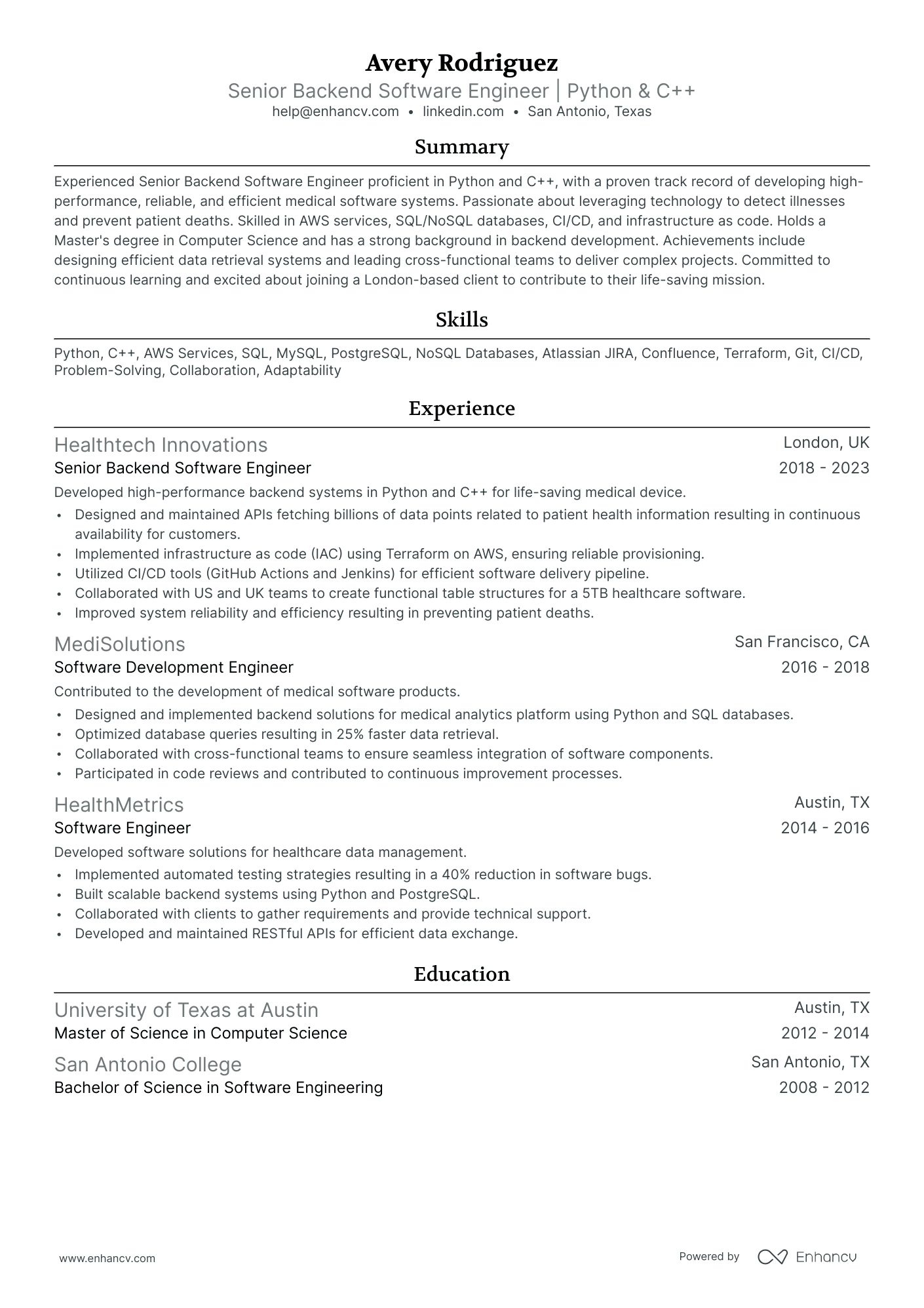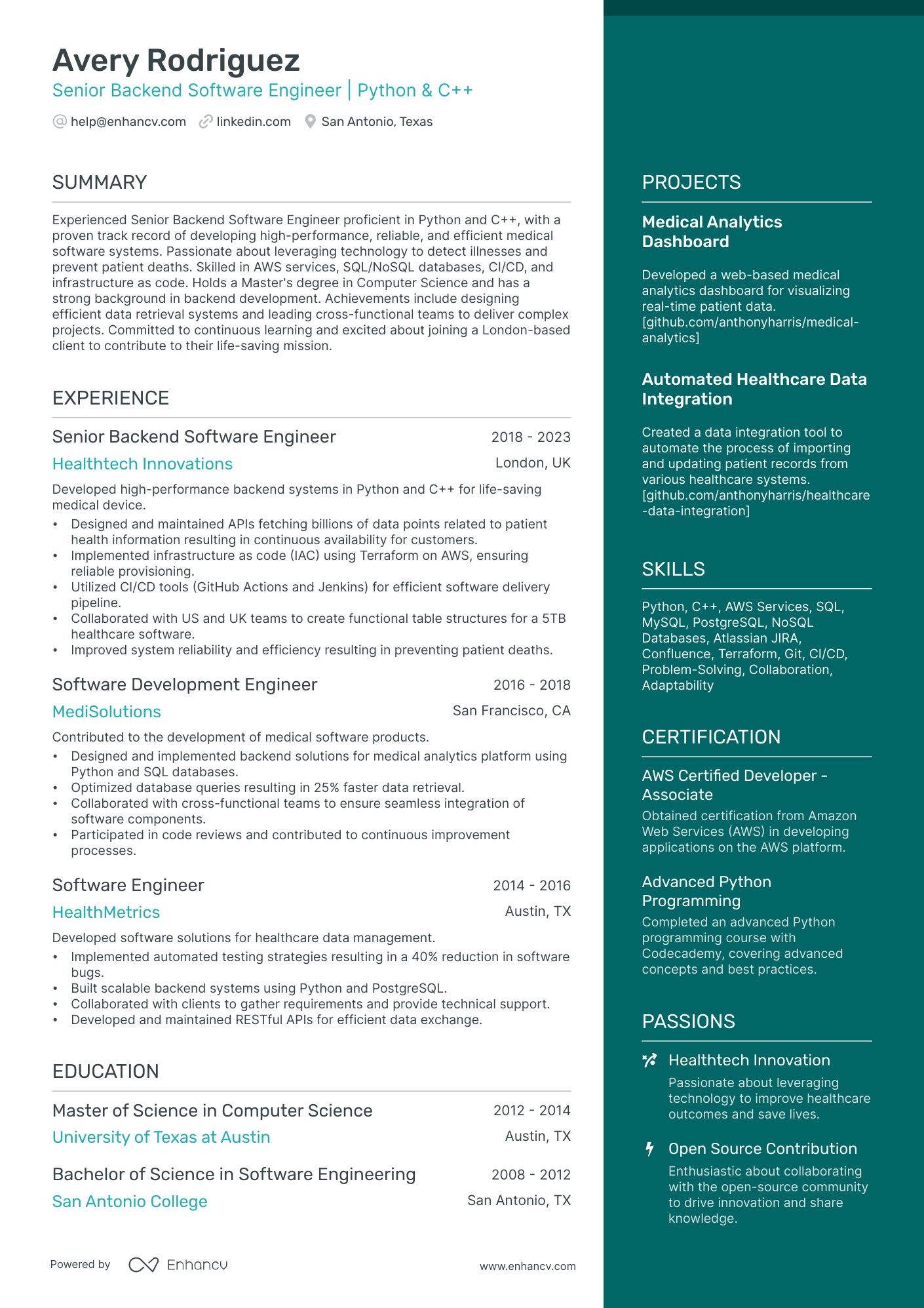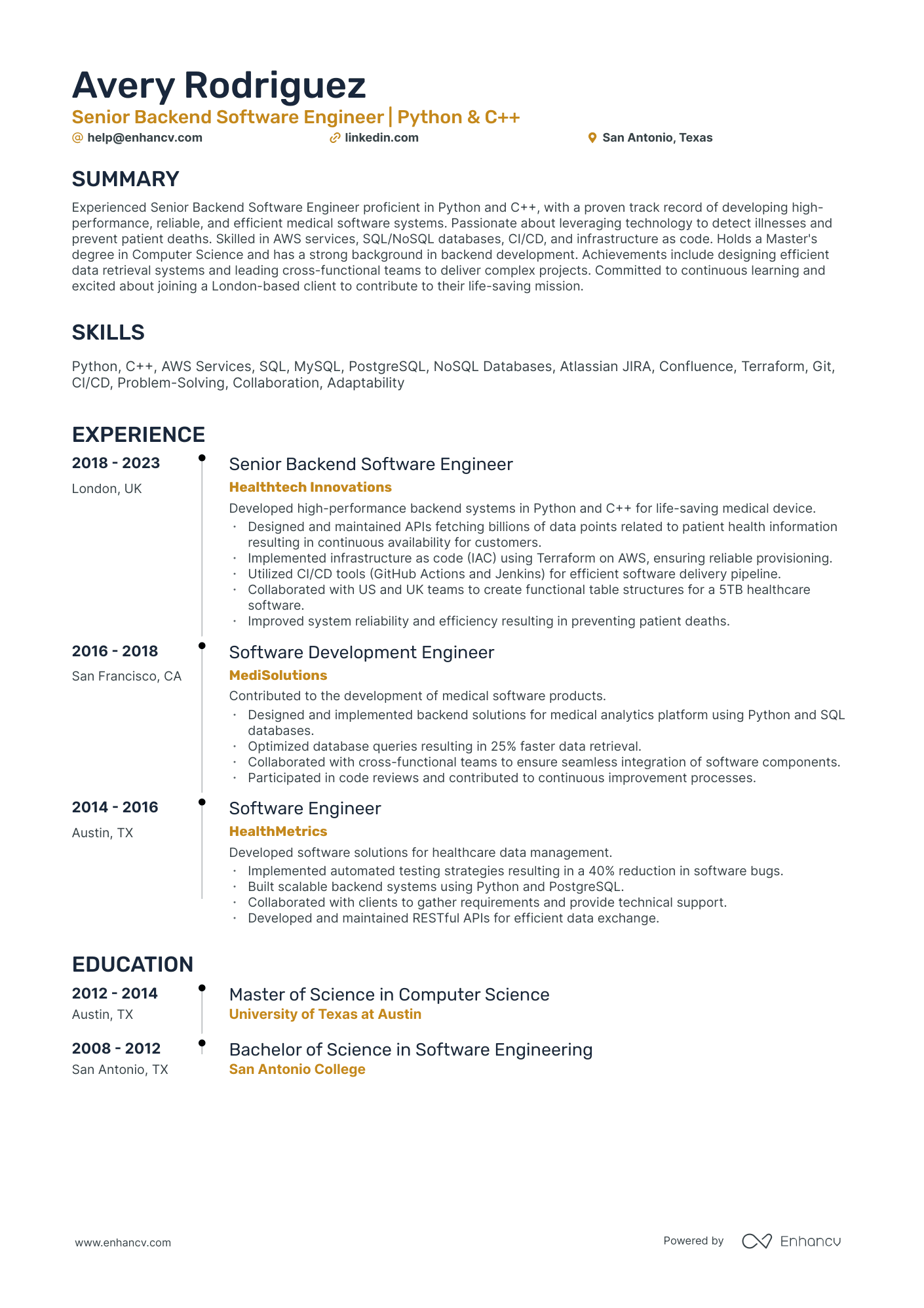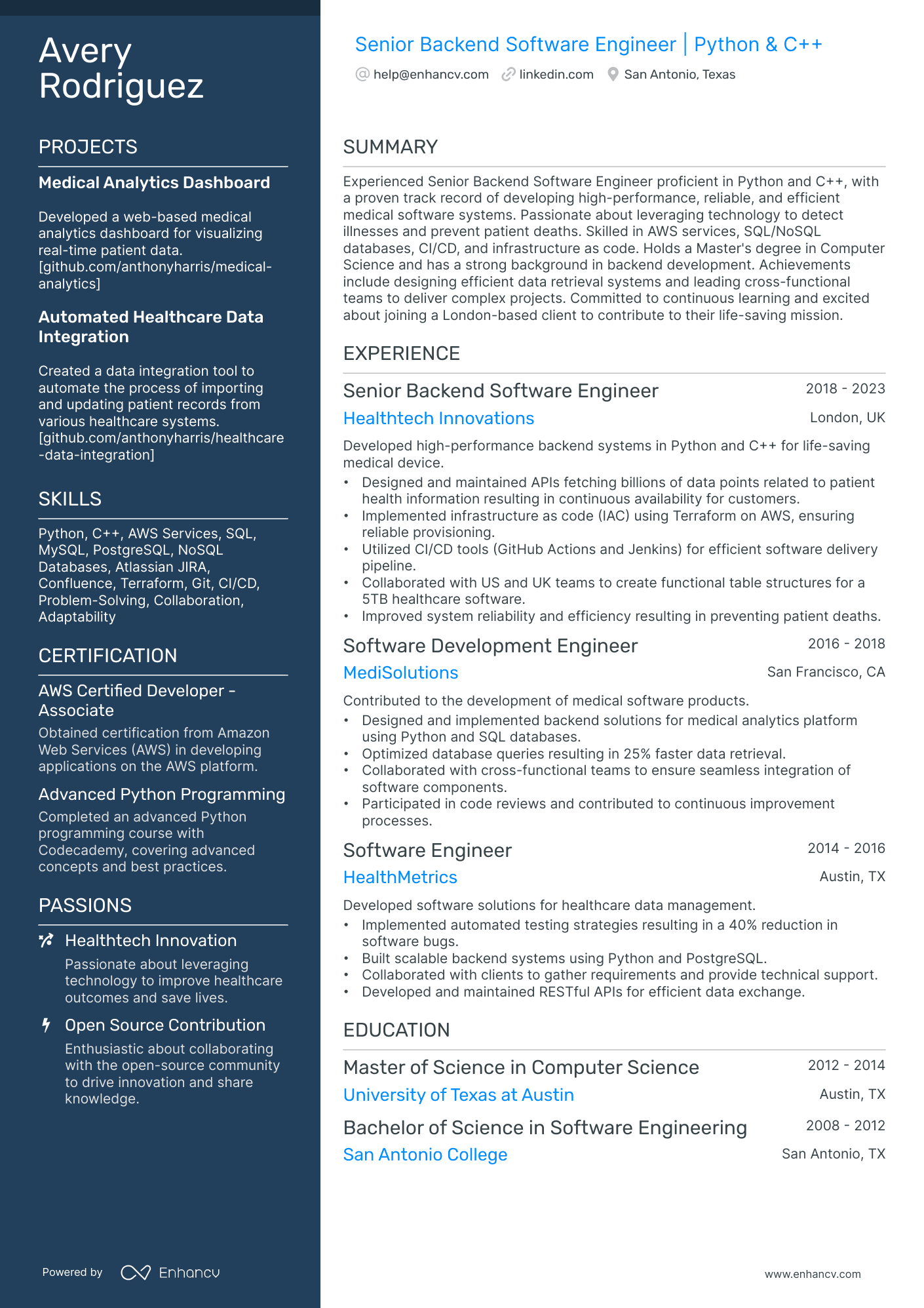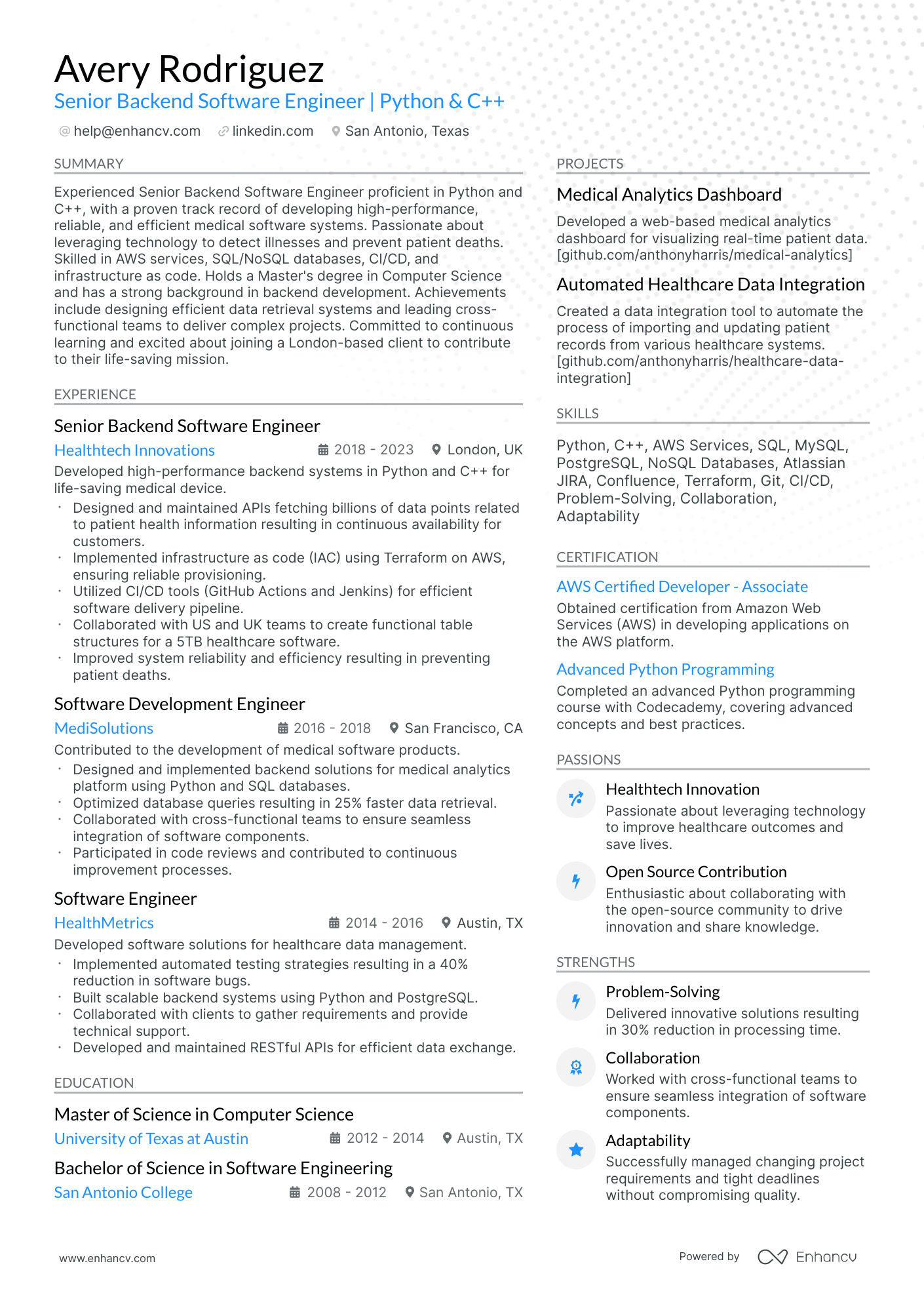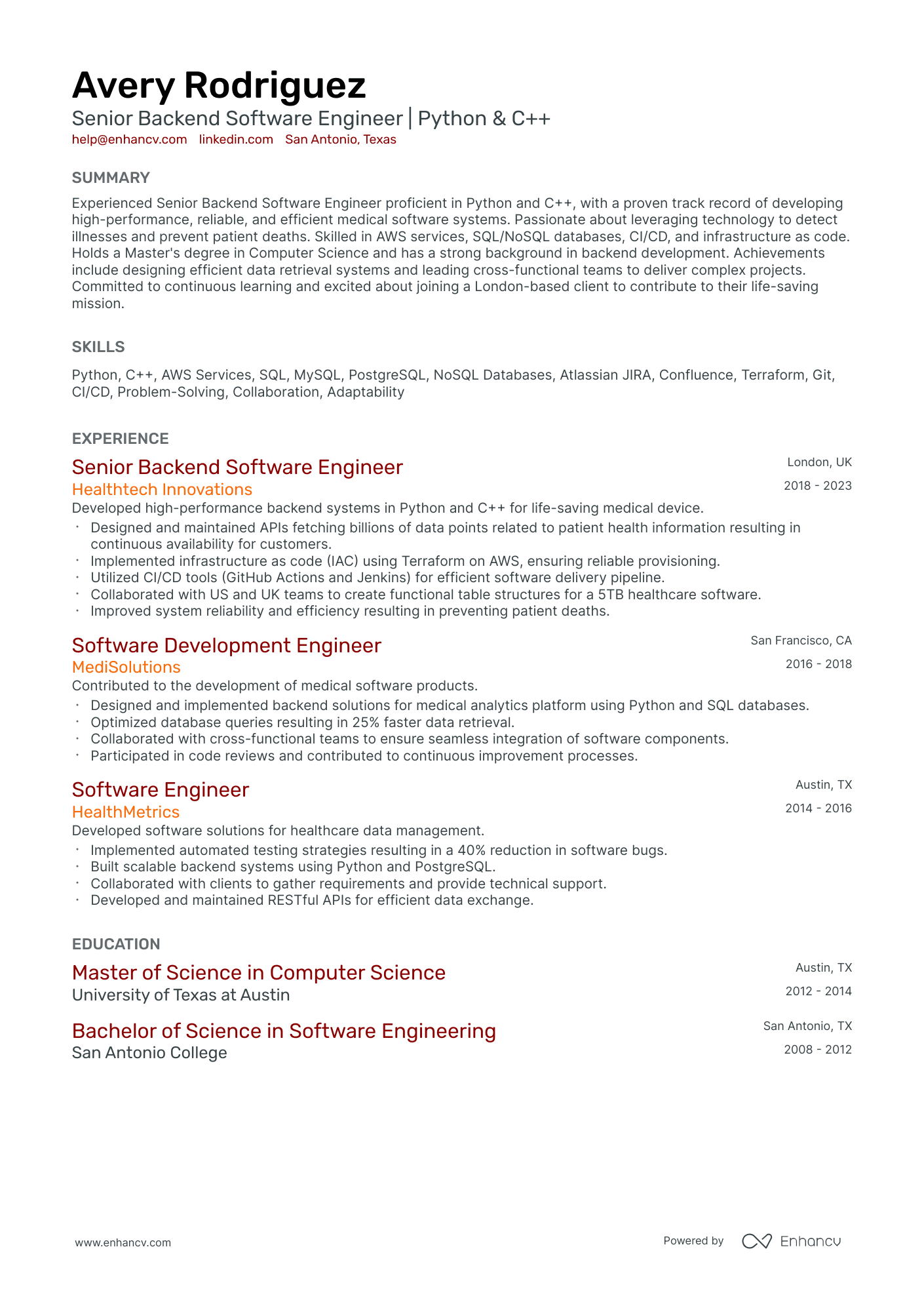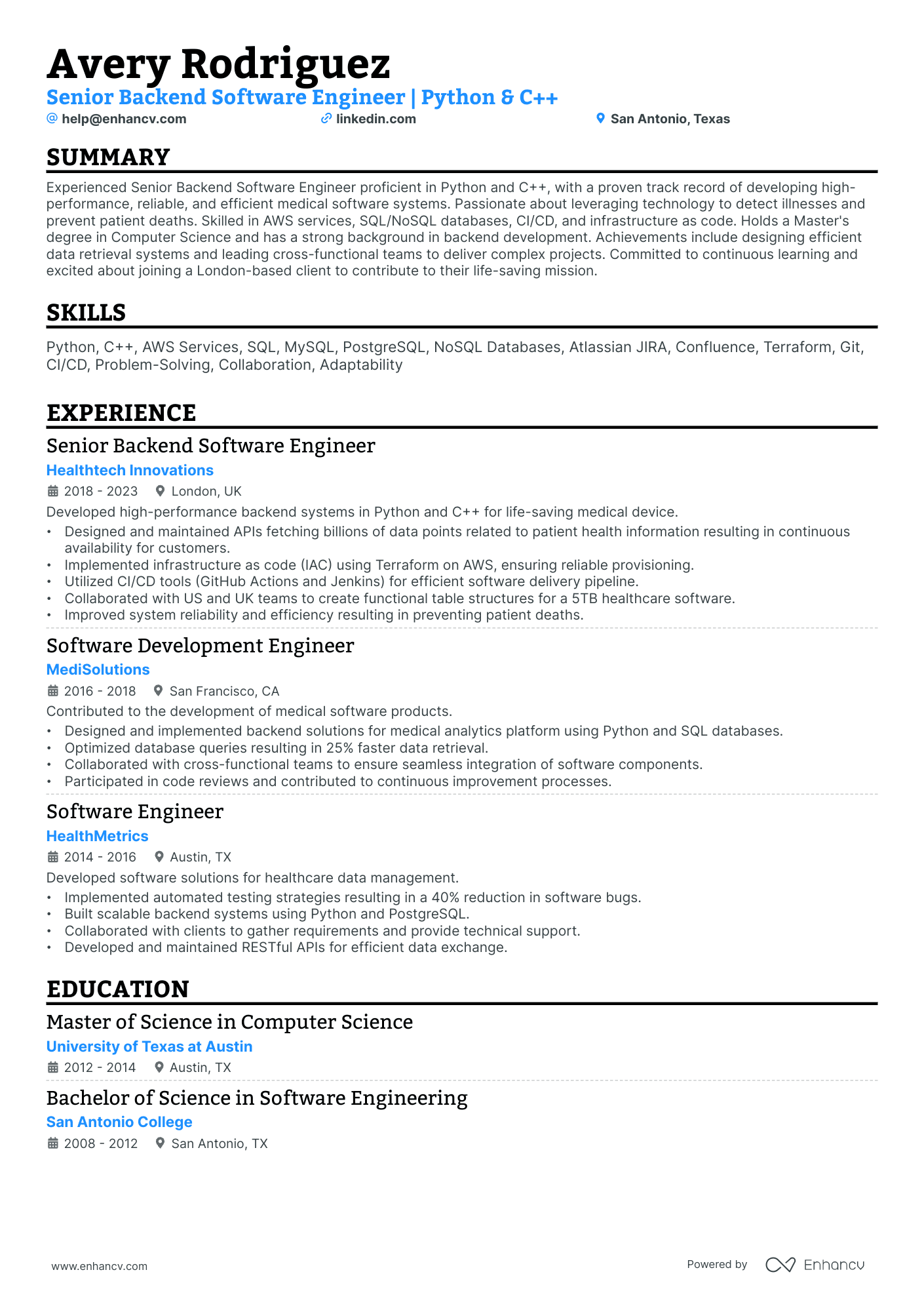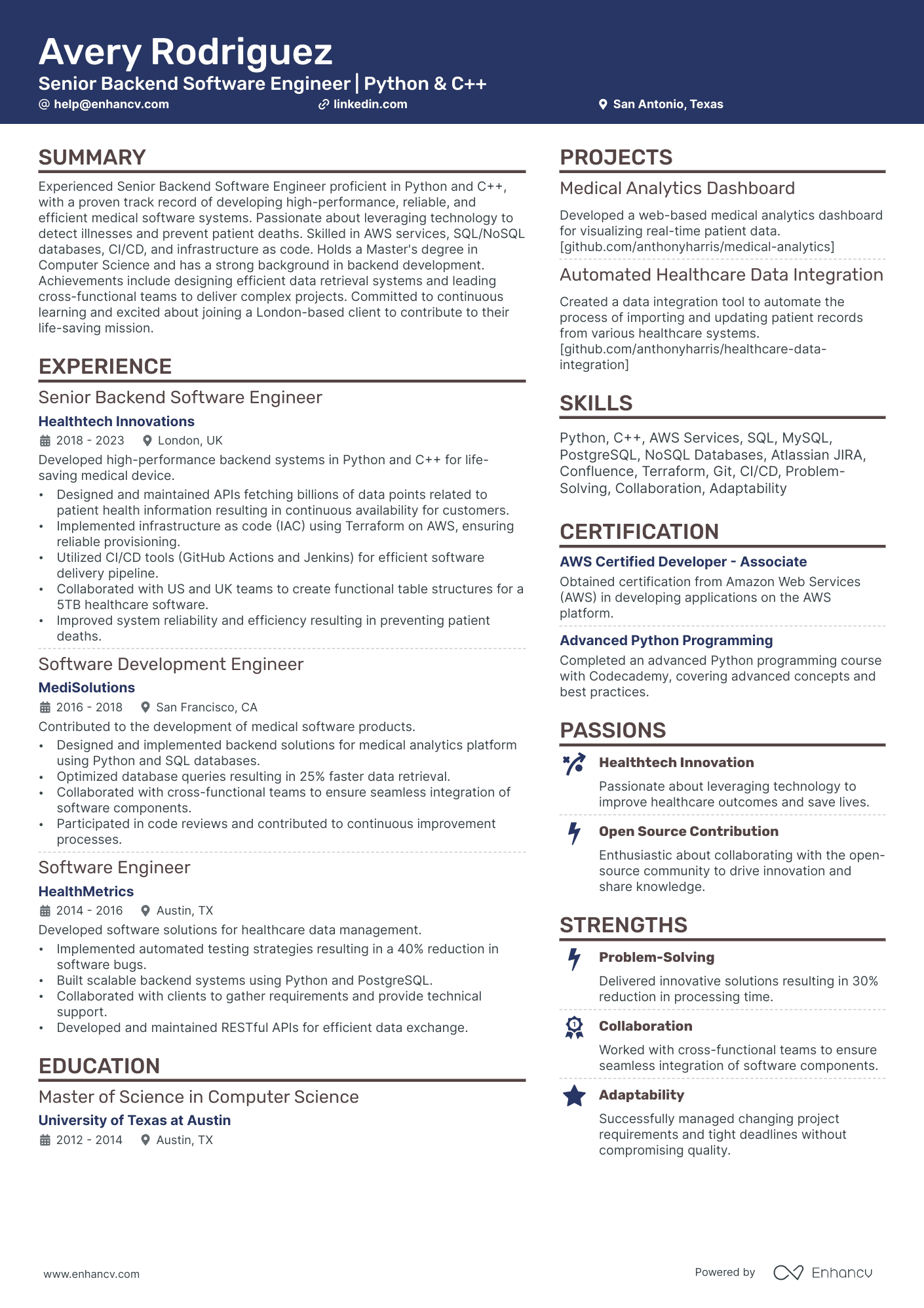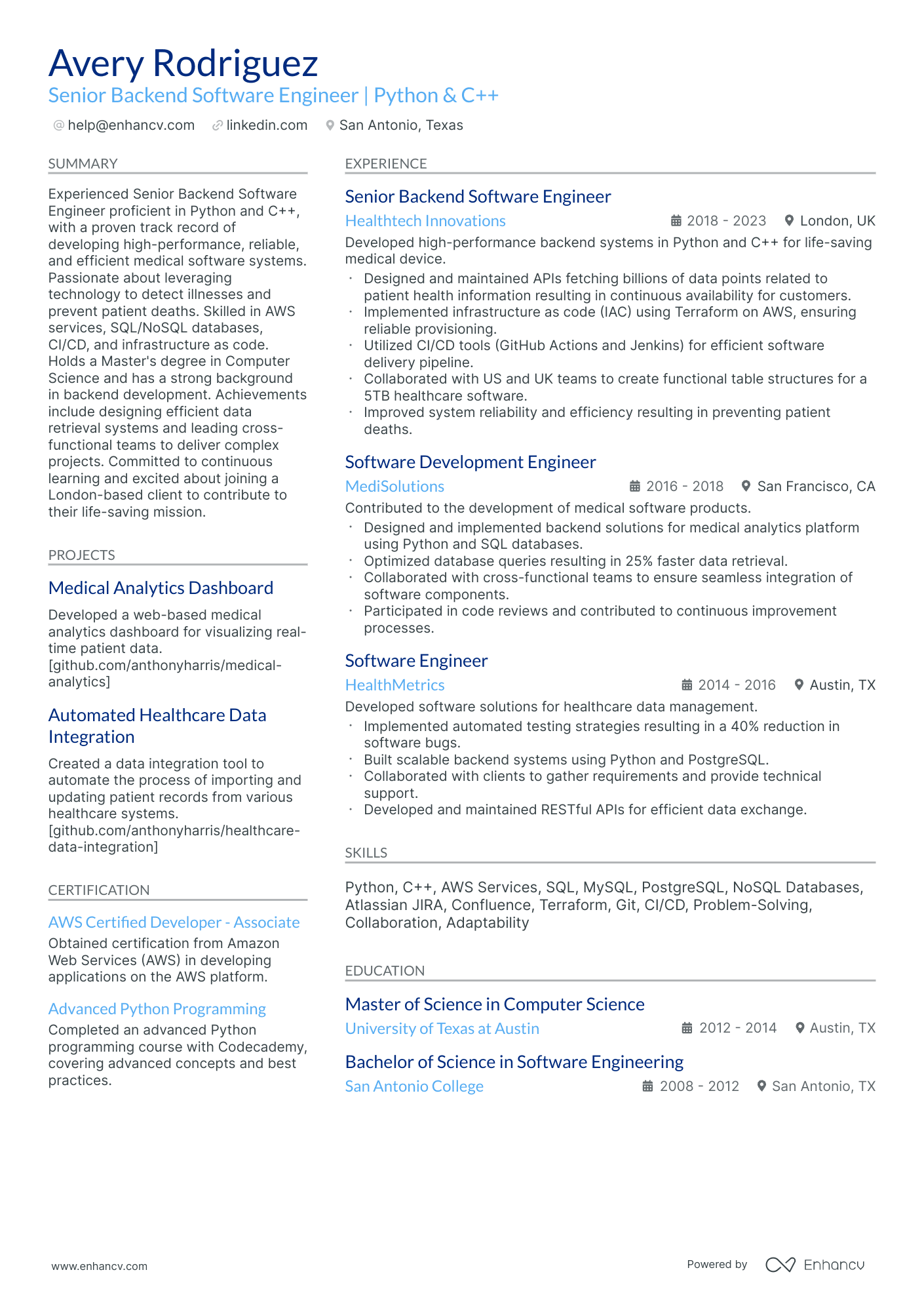One notable challenge faced by cloud architects in crafting their resumes is efficiently demonstrating their prodigious technical expertise, including cloud-related technologies and platforms, without overwhelming non-technical readers such as HR personnel. Our guide assists in addressing this issue by providing strategies on how to effectively structure information, use layman-friendly language without losing technical depth, and highlighting key achievements that can be understood and appreciated by all readers irrespective of their technical background.
Dive into our cloud architect resume guide to:
- Explore top-tier resume examples, offering insights into the industry's best practices.
- Enhance sections like experience, education, and achievements with expert advice.
- Articulate your technical prowess and personal attributes, setting you apart from other candidates.
- Sharpen your focus on the distinct skills that make your cloud architect resume resonate with recruiters.
Recommended reads:
Tips for refining your cloud architect resume format
The resume format sets the stage for your professional narrative. Ensure it:
- Adopts the reverse-chronological format, placing your most recent experiences at the forefront. This format is ideal for those with relevant and up-to-date experience.
- Features a clear headline, making it straightforward for recruiters to access your contact details, portfolio, or current role.
- Stays concise, ideally spanning no more than two pages, focusing on relevant experiences and skills.
- Maintains its layout by being saved as a PDF, ensuring compatibility with Applicant Tracking Systems (ATS).
Be aware of location-based layout differences – Canadian resumes, for instance, might differ in format.
Upload your resume
Drop your resume here or choose a file. PDF & DOCX only. Max 2MB file size.
Pro tip
While color can enhance your cloud architect resume by emphasizing key details like headlines, job titles, and degrees, moderation is key. Stick to a primary and a secondary color to maintain professionalism and avoid a cluttered appearance.
Must-have sections on a cloud architect resume:
- A header to list your job title and contact information
- A resume summary or objective which highlights your top career achievements
- A detailed experience section where you emphasize the breadth of your expertise
- A skills box to put the spotlight on your social talents and technical strengths
- An education and certifications section which features your qualifications
What recruiters want to see on your resume:
- Proven experience with cloud technologies such as AWS, Google Cloud Platform, or Microsoft Azure.
- Demonstrated capabilities in designing, planning, and managing robust cloud architectures.
- Strong understanding of cloud security principles and how they apply to cloud architecture.
- Certifications relevant to the role, such as AWS Certified Solutions Architect, Google Professional cloud architect, or Microsoft Certified: Azure Solutions Architect Expert.
- Experience with Infrastructure as Code (IaC) tools like Terraform or CloudFormation.
Recommended reads:
How to create the cornerstone experience section of your cloud architect resume
A meticulously crafted cloud architect resume experience section is a recruiter's delight. This segment not only responds to job criteria but also throws light on your technical expertise and character.
To craft an impactful experience section:
- Highlight roles directly related to the position in question.
- Pair each role or task with a metric that quantifies your achievements.
- Chronicle your cloud architect career progression, illustrating your dedication and growth in the domain.
- For each role, elucidate challenges faced, strategies employed, and the broader organizational impact.
Examine the following cloud architect samples to discern how seasoned professionals have articulated their experiences:
- Designed and implemented scalable cloud solutions for a Fortune 500 company, resulting in a 30% reduction in infrastructure costs.
- Led a team of cloud architects in migrating legacy applications to AWS, enabling improved performance and cost efficiency.
- Developed automation scripts using Python and Ansible, reducing deployment time by 50%.
- Implemented high availability and disaster recovery strategies for critical applications, ensuring 99.99% uptime.
- Collaborated with cross-functional teams to develop cloud-native architectures and microservices-based applications.
- Architected and deployed hybrid cloud solutions, integrating on-premises infrastructure with Azure, resulting in cost savings of $500,000 annually.
- Managed the migration of enterprise applications to the cloud, delivering a 40% improvement in application performance.
- Led the implementation of DevOps practices, increasing software delivery frequency by 70%.
- Designed and implemented identity and access management solutions for cloud environments, ensuring robust security.
- Provided technical guidance and mentoring to junior cloud architects, fostering their professional growth.
- Built and managed private cloud infrastructure for a financial institution, resulting in a 50% reduction in IT operational costs.
- Designed and executed a cloud migration strategy for legacy applications, improving scalability and availability.
- Developed disaster recovery plans and conducted regular simulations, ensuring business continuity in case of system failures.
- Implemented infrastructure-as-code practices using Terraform, reducing deployment time by 75%.
- Collaborated with application development teams to optimize cloud resource utilization and performance.
- Led the design and implementation of a multi-cloud strategy, leveraging AWS, Azure, and Google Cloud Platform, resulting in enhanced flexibility and reduced vendor lock-in.
- Migrated monolithic applications to containerized microservices architecture using Kubernetes, achieving improved scalability and fault tolerance.
- Developed cost optimization frameworks, reducing cloud spending by 20% through rightsizing and resource allocation strategies.
- Performed security assessments and implemented security controls, ensuring compliance with industry standards and regulations.
- Collaborated with cross-functional teams to develop cloud governance policies and guidelines.
- Designed and implemented scalable cloud solutions for startups, enabling rapid growth and seamless scaling.
- Migrated on-premises infrastructure to AWS, resulting in increased availability and improved disaster recovery capabilities.
- Developed serverless architectures using AWS Lambda, reducing operational costs by 40%.
- Automated deployment processes using Jenkins and GitLab CI/CD pipelines, improving software delivery efficiency.
- Provided technical expertise and guidance to clients, assisting them in adopting cloud technologies and best practices.
- Architected and deployed multi-region cloud solutions on Azure, ensuring high availability and disaster recovery.
- Led the migration of legacy systems to the cloud, enabling scalability and improved performance for a global e-commerce platform.
- Implemented automated monitoring and alerting solutions using Azure Monitor, resulting in proactive issue detection and resolution.
- Designed and implemented serverless architectures leveraging Azure Functions, optimizing costs and resource utilization.
- Collaborated with cross-functional teams to design and implement data lake solutions on Azure, enabling advanced analytics capabilities.
- Architected and implemented cloud-native solutions on Google Cloud Platform (GCP), leveraging containers and Kubernetes.
- Migrated on-premises workloads to GCP, resulting in reduced maintenance efforts and improved scalability.
- Developed CI/CD pipelines using Jenkins and Google Cloud Build, enabling streamlined software delivery.
- Implemented data replication and synchronization mechanisms across regions using Google Cloud Storage and BigQuery.
- Collaborated with development teams to optimize application performance and cost efficiency on GCP.
- Designed and implemented highly available cloud solutions on AWS, ensuring 99.99% uptime for mission-critical applications.
- Migrated on-premises infrastructure to AWS, resulting in improved scalability and cost efficiency.
- Developed infrastructure automation scripts using CloudFormation and Ansible, reducing deployment time by 60%.
- Implemented disaster recovery strategies and conducted regular failover tests, ensuring business continuity.
- Collaborated with cross-functional teams to define cloud architecture standards and best practices.
- Architected and deployed cloud solutions on IBM Cloud (formerly known as SoftLayer), enabling global scalability and high performance.
- Migrated legacy applications to the cloud, resulting in improved resource utilization and reduced maintenance costs.
- Developed automation frameworks using Chef and Puppet, streamlining deployment and configuration management processes.
- Implemented backup and disaster recovery solutions using IBM Cloud Object Storage, ensuring data protection and availability.
- Collaborated with clients to define cloud adoption strategies and deliver tailored solutions based on their business needs.
- Designed and implemented hybrid cloud solutions, integrating VMware virtualization with public cloud platforms like Azure and AWS.
- Migrated legacy applications to virtualized environments, improving scalability and reducing hardware costs.
- Developed disaster recovery plans and conducted regular tests, ensuring minimal downtime in case of failures.
- Implemented automated provisioning and configuration management using VMware vRealize Suite, increasing operational efficiency.
- Collaborated with infrastructure teams to optimize virtualization performance and capacity planning.
The following content includes information from "O*NET OnLine" by the U.S. Department of Labor, Employment and Training Administration (USDOL/ETA). Used under the CC BY 4.0 license. The data represents the top responsibilities present on the task lists for cloud architect professionals.
Top Responsibilities for Cloud Architect:
- Develop disaster recovery plans.
- Develop or recommend network security measures, such as firewalls, network security audits, or automated security probes.
- Develop and implement solutions for network problems.
- Maintain networks by performing activities such as file addition, deletion, or backup.
- Coordinate network operations, maintenance, repairs, or upgrades.
- Coordinate installation of new equipment.
- Monitor and analyze network performance and reports on data input or output to detect problems, identify inefficient use of computer resources, or perform capacity planning.
- Develop network-related documentation.
- Develop and write procedures for installation, use, or troubleshooting of communications hardware or software.
- Participate in network technology upgrade or expansion projects, including installation of hardware and software and integration testing.
Quantifying impact on your resume
<ul>
Building a cloud architect resume when experience is sparse
If you're light on relevant experience, consider highlighting:
- Short-term roles or internships undertaken during your academic years.
- Contractual roles, emphasizing their relevance and the outcomes achieved.
- Alternative resume formats, such as functional or hybrid, that spotlight your skills.
- Research roles, especially if they involved significant projects or if your contribution was pivotal to the project's success.
Pro tip
Remember, the experience section isn't just about traditional roles. It's a space to highlight all professional learning, whether from internships, contract roles, research projects, or other relevant experiences. If it's added value to your skill set for the cloud architect role, it deserves a mention.
Decoding the essence of your cloud architect resume: hard and soft skills
Every job description communicates the desired hard and soft skills. These skills are the backbone of your application.
Hard skills are your tangible, technical proficiencies, often validated through certifications or hands-on experience. On the other hand, soft skills reflect your interpersonal abilities and how you navigate diverse work environments.
To effectively spotlight these skills on your resume:
- Create a distinct section for technical skills, listing the most relevant ones for the job.
- Highlight your strengths by weaving in achievements that underscore specific skills.
- Strike a balance between hard and soft skills to present a well-rounded profile.
- If multilingual, include a language proficiency section, emphasizing the interpersonal advantages it brings.
Stay tuned for a deep dive into the most in-demand hard and soft skills in the industry.
Top skills for your cloud architect resume:
AWS
Azure
Google Cloud Platform
Docker
Kubernetes
Terraform
Cloud Security
Microservices Architecture
API Management
Networking and Load Balancing
Communication
Problem-Solving
Analytical Thinking
Team Collaboration
Adaptability
Project Management
Time Management
Critical Thinking
Creativity
Leadership
Next, you will find information on the top technologies for cloud architect professonals from "O*NET OnLine" by the U.S. Department of Labor, Employment and Training Administration (USDOL/ETA). Used under the CC BY 4.0 license.
Top technologies for Cloud Architect’s resume:
- Google Angular
- Spring Framework
- Blink
- Symantec Intruder Alert
- Wireshark
Pro tip
Double-check the spelling of all skills and tools on your resume. Remember, software like the Applicant Tracker System (ATS) scans for these details.
Detailing your education and top cloud architect certifications on your resume
Your education section can reflect a variety of skills and experiences relevant to the position.
- List post-secondary qualifications, noting the institution and duration.
- If you're currently studying, mention your expected graduation date.
- Exclude qualifications unrelated to the role or industry.
- If relevant, delve into your educational background, especially if it was research-intensive.
Including both relevant education and certifications on your cloud architect resume can set you apart. It not only showcases your qualifications but also your commitment to the profession.
When listing these on your cloud architect resume, make sure to:
- Highlight degrees and certificates relevant to the role.
- Mention the awarding institution for credibility.
- Include the start and end dates, or if the education/certification is ongoing.
- If relevant, incorporate a few keywords from the job advert within the description of the certification or degree.
If you have additional certifications not directly related to the role, consider placing them towards the end of your resume. This way, they can be viewed as personal interests rather than core qualifications.
For a quick update, check out our list of popular cloud architect certifications curated by the Enhancv team.
Best certifications to list on your resume
- Amazon Web Services (AWS) Certified Solutions Architect - Professional - AWS
- Google Professional cloud architect - Google Cloud
- Microsoft Certified: Azure Solutions Architect Expert - Microsoft
- Certified Cloud Security Professional (CCSP) - ISC²
- CompTIA Cloud+ - CompTIA
- Cisco Certified Network Professional Cloud (CCNP Cloud) - Cisco
Pro tip
The reputation of the institution or organization granting your certification or degree can bolster your credibility. Prioritize recognized and respected credentials.
Recommended reads:
Adding a summary or objective to your cloud architect resume
One of the most crucial elements of your professional presentation is your resume's top one-third.
This most often includes:
- Either a resume summary - your career highlights at a glance. Select the summary if you have plenty of relevant experience (and achievements), you'd like recruiters to remember about your application.
- Or, a resume objective - to showcase your determination for growth. The perfect choice for candidates with less experience, who are looking to grow their career in the field.
If you want to go above and beyond with your cloud architect resume summary or resume objective, make sure to answer precisely why recruiters need to hire you.
What is the additional value you'd provide to the company or organization?
Now here are examples from real-life cloud architect professionals, whose resumes have helped them land their dream jobs:
Resume summary and objective examples for a cloud architect resume
- Experienced cloud architect offering a 10-year career history highlighted by roles at XYZ Tech and ABC Computing. Well-versed in designing, developing, and managing robust cloud infrastructures using AWS and Azure. Recognized for leading a successful migration of 50+ applications to the cloud at XYZ Tech.
- Seven years' experience as a Software Engineer now seeking to leverage programming skills (Python, Java) in cloud architecture at DEF Corporation. Proven record in solving complex technical problems; led the design and implementation of an award-winning software system at previous employer.
- Senior Network Engineer with over a decade of experience, eager to transition into the cloud architect domain at GHI Enterprise. Proficient in network modeling and simulation tools, with a significant understanding of cloud-based systems like Google Cloud and AWS. Successfully expanded network infrastructure at previous company, supporting 500+ users.
- With a background in System Administration spanning 8 years, ready to pivot to the dynamic field of cloud architecture at JKL Inc. Skilled in Linux/UNIX environments, with a firm grasp of virtualization techniques and cloud services such as Azure and Google Cloud. Implemented a comprehensive security protocol that significantly reduced system vulnerabilities in the past role.
- Eager to commence a career in cloud architecture at MNO Technologies. Graduated top of class in Computer Science, coupled with a certification in AWS Solutions Architect. Proficient in Python, SQL, and Java with a strong understanding of cloud services, network protocols, and virtualization.
- Aspiring cloud architect with a recent Masters in Information Systems seeks to contribute academic knowledge and internship experience to NOP Solutions. Proficient in DevOps methods, container concepts, and familiar with cloud platforms like AWS and Google Cloud. Developed a cloud-based application during an internship which improved process efficiency by 30%.
Extra sections to include in your cloud architect resume
What should you do if you happen to have some space left on your resume, and want to highlight other aspects of your profile that you deem are relevant to the role?
Add to your cloud architect resume some of these personal and professional sections:
- Passions/Interests - to detail how you spend both your personal and professional time, invested in various hobbies;
- Awards - to present those niche accolades that make your experience unique;
- Publications - an excellent choice for professionals, who have just graduated from university or are used to a more academic setting;
- < a href="https://enhancv.com/blog/volunteering-on-resume/"> Volunteering - your footprint within your local (or national/ international) community.
Key takeaways
- Format your cloud architect resume for clarity and coherence, ensuring it aligns with the role.
- Highlight key sections (header, summary/objective, experience, skills, certifications) within your cloud architect resume.
- Quantify achievements and align them with skills and job requirements.
- Feature both technical and personal skills across your resume for a balanced portrayal.
